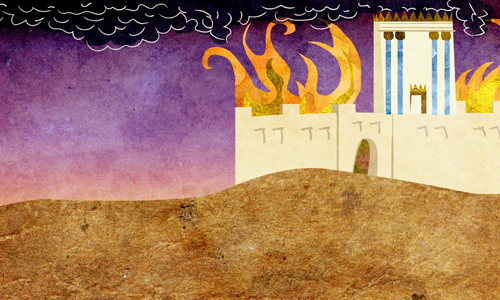
Tisha B’Av, the 9th day of the month of Av (July. 29-30, 2020), is the saddest day on the Jewish calendar, on which we fast, deprive ourselves and pray. It is the culmination of the Three Weeks, a period of time during which we mark the destruction of the Holy Temple in Jerusalem.
What Happened on 9 Av?

1313 BCE: The spies returned from the Promised Land with frightening reports, and the Israelites balked at the prospect of entering the land. G?d decreed that they would therefore wander in the desert for 40 years. Read more.
Both Holy Temples in Jerusalem were destroyed on this date. The First Temple was burned by the Babylonians in 423 BCE (read more) and the Second Temple fell to the Romans in 70 CE (read more), unleashing a period of suffering from which our nation has never fully recovered.
The Bar Kochba revolt against the Romans in 133 CE ended in defeat: The Jews of Betar were butchered on the 9th of Av and the Temple Mount was plowed one year later on the same date. Read more.
Later on in our history, many more tragedies happened on this day, including the 1290 expulsion of England’s Jews and the 1492 banishment of all Jews from Spain. Read more.
How 9 Av Is Observed

The fast begins at sunset of the 8th of Av and concludes at nightfall the following night(delayed by one day when 9 Av is on Shabbat). During this time, we do not
- eat or drink
- wear leather footwear
- bathe or wash ourselves (washing only until the knuckle when mandated by halachah)
- apply ointments or creams
- engage in marital relations or any form of intimacy
- sit on a normal-height chair until chatzot (the time when the sun has reached its apex)
- study Torah (except for the “sad” parts that deal with the destruction of the Temples, etc.)
- send gifts, or even greet one another (you may respond to greetings)
- engage in outings, trips or similar pleasurable activities
- wear fine, festive clothing
What We Do

Starting from midday on 8 Av, we limit our Torah study to the few allowed topics that are of a sad nature or pertain to the Temples’ destruction.
We eat a square meal in the afternoon, before Minchah services. Then, late in the afternoon, a “separation meal,” seudah hamafseket, is eaten. It consists of bread and a hard-boiled egg dipped in ashes, accompanied by water. This meal is eaten alone, sitting on a low stool.
The meal must be over by sundown, when all the laws of Tisha B’Av take effect.
Tisha B’Av evening services are held in synagogue, where the ark has been stripped of its decorative curtain and the lights dimmed. Evening prayers are followed by the chanting of Eichah (Lamentations).
Morning prayers are held without tallit and tefillin, since both are considered adornments. Most of the morning is occupied by the reading of Kinot, elegies marking the various tragedies that befell our people.
Work is permitted on Tisha B’Av, but discouraged. On this day, one’s focus should be on mourning and repentance. If one must work, it is preferable to begin after midday.
It is customary to give extra charity on Tisha B’Av, as on every fast day.
After midday, it is permissible to sit on chairs, and tallit and tefillin are worn during the afternoon prayer. In the synagogue, the ark’s curtain is restored to its place before the afternoon prayers.
Many communities have the custom to clean the house and wash the floors after midday, in anticipation of the Redemption, which we await.
Many important details and laws can be found in Order of the Day and What to Expect at Tisha B’Av Services.
After the Fast

When night falls, before breaking the fast, one should perform netilat yadayim (hand-washing), this time covering the entire hand with water, but without reciting the blessing. It is also customary to perform Kiddush Levanah at this point, celebrating the rebirth of the moon, and our hoped-for national rebirth.
The Temple was set ablaze on the afternoon of the 9th of Av, and it burned through the 10th. Therefore, the restrictions of the Nine Days (such as not eating meat, swimming or laundering clothing) extend until midday of the 10th of Av.
The Joy Within the Sadness

Even as we mourn, there is an element of joy and comfort. Indeed, the reading of Eichahconcludes with the verse “Restore us to You, O L?rd, that we may be restored! Renew our days as of old.” There is also a custom among many to use flimsy paperback Kinot booklets, hoping that they will not be needed next year.
It is by no accident that Scripture refers to this day as a mo’ed, a holiday, and Tachanun(prayer of repentance) is not said today. May the time soon come when we look back with the clarity of hindsight to see how all our suffering was but a prelude to happiness and goodness, with the coming of Moshiach. Amen!
Source: Chabad.org